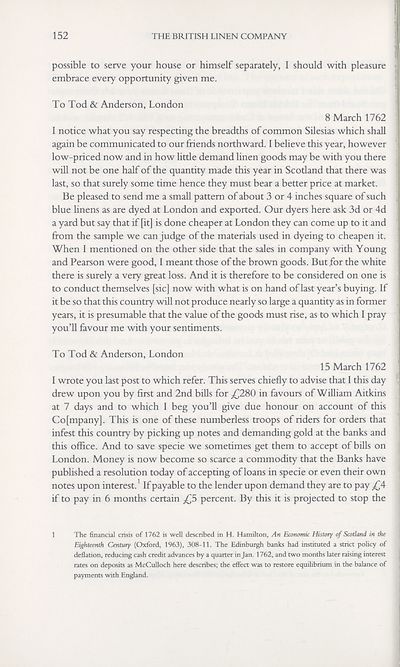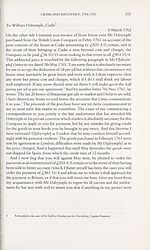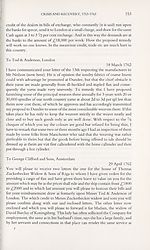Series 5 > British Linen Company, 1745-1775
(169) Page 152
Download files
Complete book:
Individual page:
Thumbnail gallery: Grid view | List view

152
THE BRITISH LINEN COMPANY
possible to serve your house or himself separately, I should with pleasure
embrace every opportunity given me.
To Tod & Anderson, London
8 March 1762
I notice what you say respecting the breadths of common Silesias which shall
again be communicated to our friends northward. I believe this year, however
low-priced now and in how litde demand linen goods may be with you there
will not be one half of the quantity made this year in Scodand that there was
last, so that surely some time hence they must bear a better price at market.
Be pleased to send me a small pattern of about 3 or 4 inches square of such
blue linens as are dyed at London and exported. Our dyers here ask 3d or 4d
a yard but say that if [it] is done cheaper at London they can come up to it and
from the sample we can judge of the materials used in dyeing to cheapen it.
When I mentioned on the other side that the sales in company with Young
and Pearson were good, I meant those of the brown goods. But for the white
there is surely a very great loss. And it is therefore to be considered on one is
to conduct themselves [sic] now with what is on hand of last year’s buying. If
it be so that this country will not produce nearly so large a quantity as in former
years, it is presumable that the value of the goods must rise, as to which I pray
you’ll favour me with your sentiments.
To Tod & Anderson, London
15 March 1762
I wrote you last post to which refer. This serves chiefly to advise that I this day
drew upon you by first and 2nd bills for £280 in favours of Wflliam Aitkins
at 7 days and to which I beg you’ll give due honour on account of this
Co[mpany], This is one of these numberless troops of riders for orders that
infest this country by picking up notes and demanding gold at the banks and
this office. And to save specie we sometimes get them to accept of bills on
London. Money is now become so scarce a commodity that the Banks have
published a resolution today of accepting of loans in specie or even their own
notes upon interest.1 If payable to the lender upon demand they are to pay £4
if to pay in 6 months certain £5 percent. By this it is projected to stop the
1 The financial crisis of 1762 is well described in H. Hamilton, An Economic History of Scotland in the
Eighteenth Century (Oxford, 1963), 308-11. The Edinburgh banks had instituted a strict policy of
deflation, reducing cash credit advances by a quarter in Jan. 1762, and two months later raising interest
rates on deposits as McCulloch here describes; the effect was to restore equilibrium in the balance of
payments with England.
THE BRITISH LINEN COMPANY
possible to serve your house or himself separately, I should with pleasure
embrace every opportunity given me.
To Tod & Anderson, London
8 March 1762
I notice what you say respecting the breadths of common Silesias which shall
again be communicated to our friends northward. I believe this year, however
low-priced now and in how litde demand linen goods may be with you there
will not be one half of the quantity made this year in Scodand that there was
last, so that surely some time hence they must bear a better price at market.
Be pleased to send me a small pattern of about 3 or 4 inches square of such
blue linens as are dyed at London and exported. Our dyers here ask 3d or 4d
a yard but say that if [it] is done cheaper at London they can come up to it and
from the sample we can judge of the materials used in dyeing to cheapen it.
When I mentioned on the other side that the sales in company with Young
and Pearson were good, I meant those of the brown goods. But for the white
there is surely a very great loss. And it is therefore to be considered on one is
to conduct themselves [sic] now with what is on hand of last year’s buying. If
it be so that this country will not produce nearly so large a quantity as in former
years, it is presumable that the value of the goods must rise, as to which I pray
you’ll favour me with your sentiments.
To Tod & Anderson, London
15 March 1762
I wrote you last post to which refer. This serves chiefly to advise that I this day
drew upon you by first and 2nd bills for £280 in favours of Wflliam Aitkins
at 7 days and to which I beg you’ll give due honour on account of this
Co[mpany], This is one of these numberless troops of riders for orders that
infest this country by picking up notes and demanding gold at the banks and
this office. And to save specie we sometimes get them to accept of bills on
London. Money is now become so scarce a commodity that the Banks have
published a resolution today of accepting of loans in specie or even their own
notes upon interest.1 If payable to the lender upon demand they are to pay £4
if to pay in 6 months certain £5 percent. By this it is projected to stop the
1 The financial crisis of 1762 is well described in H. Hamilton, An Economic History of Scotland in the
Eighteenth Century (Oxford, 1963), 308-11. The Edinburgh banks had instituted a strict policy of
deflation, reducing cash credit advances by a quarter in Jan. 1762, and two months later raising interest
rates on deposits as McCulloch here describes; the effect was to restore equilibrium in the balance of
payments with England.
Set display mode to:
![]() Universal Viewer |
Universal Viewer | ![]() Mirador |
Large image | Transcription
Mirador |
Large image | Transcription
Images and transcriptions on this page, including medium image downloads, may be used under the Creative Commons Attribution 4.0 International Licence unless otherwise stated. ![]()
| Scottish History Society volumes > Series 5 > British Linen Company, 1745-1775 > (169) Page 152 |
|---|
| Permanent URL | https://digital.nls.uk/127333077 |
|---|
| Description | Over 180 volumes, published by the Scottish History Society, containing original sources on Scotland's history and people. With a wide range of subjects, the books collectively cover all periods from the 12th to 20th centuries, and reflect changing trends in Scottish history. Sources are accompanied by scholarly interpretation, references and bibliographies. Volumes are usually published annually, and more digitised volumes will be added as they become available. |
|---|


